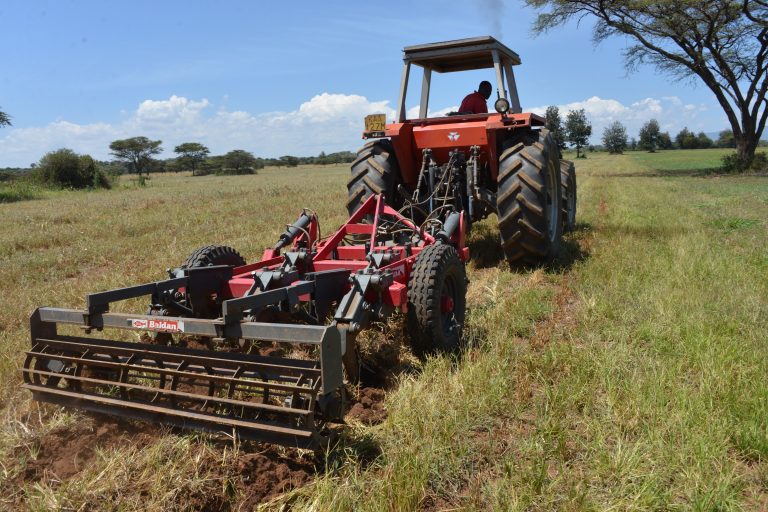
Faced with the challenges of climate change, erratic rainfall and the need to boost crop yields farmers in Kenya are turning to minimum tillage to safeguard harvest and is far more reachable than turning to the need for large investments in irrigation. This involves changing from traditional implements to using a chisel plow, or subsoiler and a crumbler roller to prepare land for planting.
Comparing minimum tillage with current widespread farming method Fergus Robley, the Managing Director of FMD, the Massey Ferguson distributor, said, “The common practice of using disc ploughs to invert the soil results in unnecessary moisture loss and following up with a disc harrow gives further residual moisture loss along with soil degradation. This method makes a dry seedbed with poor soil structure and results in crop yield limitations”.
“In contrast preparing land for cultivation with a chisel plough, or a deep subsoiler preserves moisture in the soil and allows for an economical one pass for land preparation. As a farmer in a low rainfall area summed up, “Moisture in the soil is as good as money in the bank”
In addition, the regular use of disc ploughs and harrows over a period of years is poor farming practice causing mechanical conditions like hard pans and does not protect the soils for our future generations. The most common result which we see too often today is severe rain and wind erosion. This is not only an eyesore but leaves fields redundant for future food production.
Preparing soil with a chisel plough, or deep subsoiler protects moisture and preserves surface trash whilst providing the necessary aeration and soil shattering under the surface. This retention of valuable moisture is comparable to that of a forest floor with fallen leaves on the surface which provides similar preservation of moisture by acting as an umbrella for the soil.
One pass with a crumbler roller after working with the subsoiler leaves the land ready for planting. Clearing the necessary weeds for planting can be achieved by using a cultivator (mechanical method), or crop sprayer (chemical method) prior to planting. The latter usually gives better results.
While minimum tillage cultivation is of great importance in dry low rainfall areas like Kampi Ya Moto and Laikipia, it is important on every farm anywhere in Kenya! Embracing good farming techniques improves yields and profit for the farmer’s pocket. Low rainfall areas in Australia with less rain than Laikipia regularly have good harvests from what is known as “conservation agriculture “which is primarily about the preservation of soil moisture.
Explaining the equipment needed for minimum tillage Fergus Robley stated, “A farmer needs, a good 4WD tractor, a subsoiler, a sprayer in good working condition and a planter that is set up correctly to give the necessary plant population. Calibration of sprayers and planters is a key for successful farming.”
“The best land preparation is achieved using a deep tine to penetrate the soil to a depth of 18 inches (45cm) to overcome the mechanical hardpan that usually occurs at eight to ten inches below the surface which results from years of disc ploughing and harrowing. The addition of using a subsoiler with a crumbler also provides a level and favorable seedbed for planting.”





